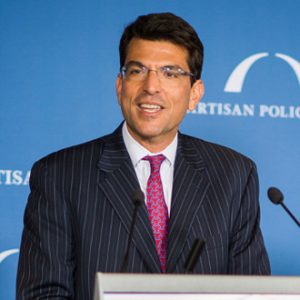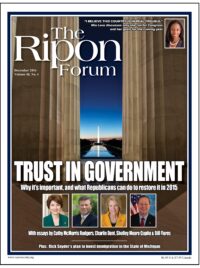 Of late, many leading politicians are calling for a return to “regular order.” For those not steeped in the nuance of congressional procedure, regular order sounds like a way to get a favorite sandwich. For the majority of Congress, regular order dictates whether they will have a meaningful role in debating and influencing legislation. For the country, regular order largely determines whether our government will be capable of solving problems.
Of late, many leading politicians are calling for a return to “regular order.” For those not steeped in the nuance of congressional procedure, regular order sounds like a way to get a favorite sandwich. For the majority of Congress, regular order dictates whether they will have a meaningful role in debating and influencing legislation. For the country, regular order largely determines whether our government will be capable of solving problems.
So, what is regular order and how would restoring it shape our nation’s future? Don Wolfensberger, an expert on Congress here at the Bipartisan Policy Center, has offered a definition: “those rules, precedents and customs of Congress that constitute an orderly and deliberative policymaking process.”
Put another way, regular order is Congress doing the basic work of legislating which includes deliberating in committees, engaging with stakeholders, offering and voting on amendments and ultimately passing or rejecting legislative proposals. These cornerstones of the democratic process have not been the hallmarks of the 113th Congress. Instead, this last Congress spent very little time in D.C. Committees were largely sidelined and worst of all, the Congress hardly ever engaged in actual debate. Not surprisingly, the result was a caustic and unproductive session. In fact, the current Congress is on track to produce the least legislation in the last 60 years.
Our cumbersome system of checks and balances was created to draw resilient and cohesive policy out of this diversity and division.
But there is good news. A very small group of legislative leaders has the power to break this vicious cycle and restore a culture of productive partisanship. Any realistic proposal to improve congressional function must appreciate that our Congress and our country are deeply divided politically, philosophically and geographically. These are not new challenges and they well describe the dynamics in place when our Constitution was crafted. Our cumbersome system of checks and balances was created to draw resilient and cohesive policy out of this diversity and division. From these hurdles and tensions, a legislative process developed to metabolize the hostility that is inherent in a pluralistic democracy. These rules and traditions are the regular order that newly elected congressional leadership has committed to restore. Some of the key steps are elaborated below:
Spend more time with colleagues: It is impossible to run a business, let alone the world’s greatest democracy, if you’re only in the office on Wednesdays. The current congressional schedule does not provide the time to engage on substantive issues or forge the relationships needed to navigate disagreements. Moreover, the Senate and House are often not even in session at the same time. In a very encouraging sign, the schedules recently released by Senator McConnell and Speaker Boehner have both chambers in session on Fridays with similar recess schedules.
Restore the authority of legislative committees: These deliberative bodies have historically been the engines of our democracy. Members spent time in their committees developing expertise and common interests that provided some ballast against purely partisan motivations. In recent years, congressional leadership has taken over the development and control of most legislation rendering the committees far less relevant. Passage of the twelve traditional appropriations bills has also been abandoned in favor of huge “continuing resolutions” funding the entire government. Such monstrosities make it practically impossible for Congress to provide responsible oversight of programs or meaningfully enhance government efficiency.
Let them vote: Open debate and amendments must be restored. Today in the Senate, the majority rarely allows open amendments and the minority requires 60 votes for most everything. Both parties deserve ample blame for abusing their procedural authority and neither can point to an “original sin” to justify its behavior. There are many nuances here, but the core solution is that the majority must allow more amendments and the minority must allow legislation to move to the floor for substantive debate without 60 votes. While the House is designed to be a majoritarian body, House leaders should consider legislation under open rules that allow for more amendments.
The purported rationale for preventing amendments has been the desire to protect members from having to take “tough votes.” Beyond the idea that tough votes are the essence of the job, the 2014 elections indicate that short-circuiting the voting process is a losing strategy. Senate efforts to “protect” endangered Democratic incumbents failed across the board. Ironically, the inability to cast “tough votes” also diminished the ability of senators to demonstrate independence and leadership. Many were undermined by opponents’ assertions that they had voted with the administration over 95% of the time.
The good news is that both houses of Congress have expressed the desire to get the legislative process back on track.
The good news is that both houses of Congress have expressed the desire to get the legislative process back on track. House Majority Leader Kevin McCarthy has already pledged to give committees a larger role. Immediately following the election, Senator McConnell promised to “get the Senate back to normal” by allowing open debates and amendments, restoring the role of committees and spending more time at work. McConnell also said, “We’re going to pass appropriations bills.”
All of this requires active support and engagement from the White House. While not explicitly involved in the congressional rules, the president has a profound role in enabling or scuttling good will between the parties. The 113th Congress is ending on a rough note, but the great thing about our democracy is that every election offers a fresh start. Just like the Chicago Cubs, Congress will begin next year undefeated. A return to the basic processes that have enabled progress despite partisanship is key to a productive 2015.
Jason Grumet is president of the Bipartisan Policy Center and author of City of Rivals: Restoring the Glorious Mess of American Democracy.




